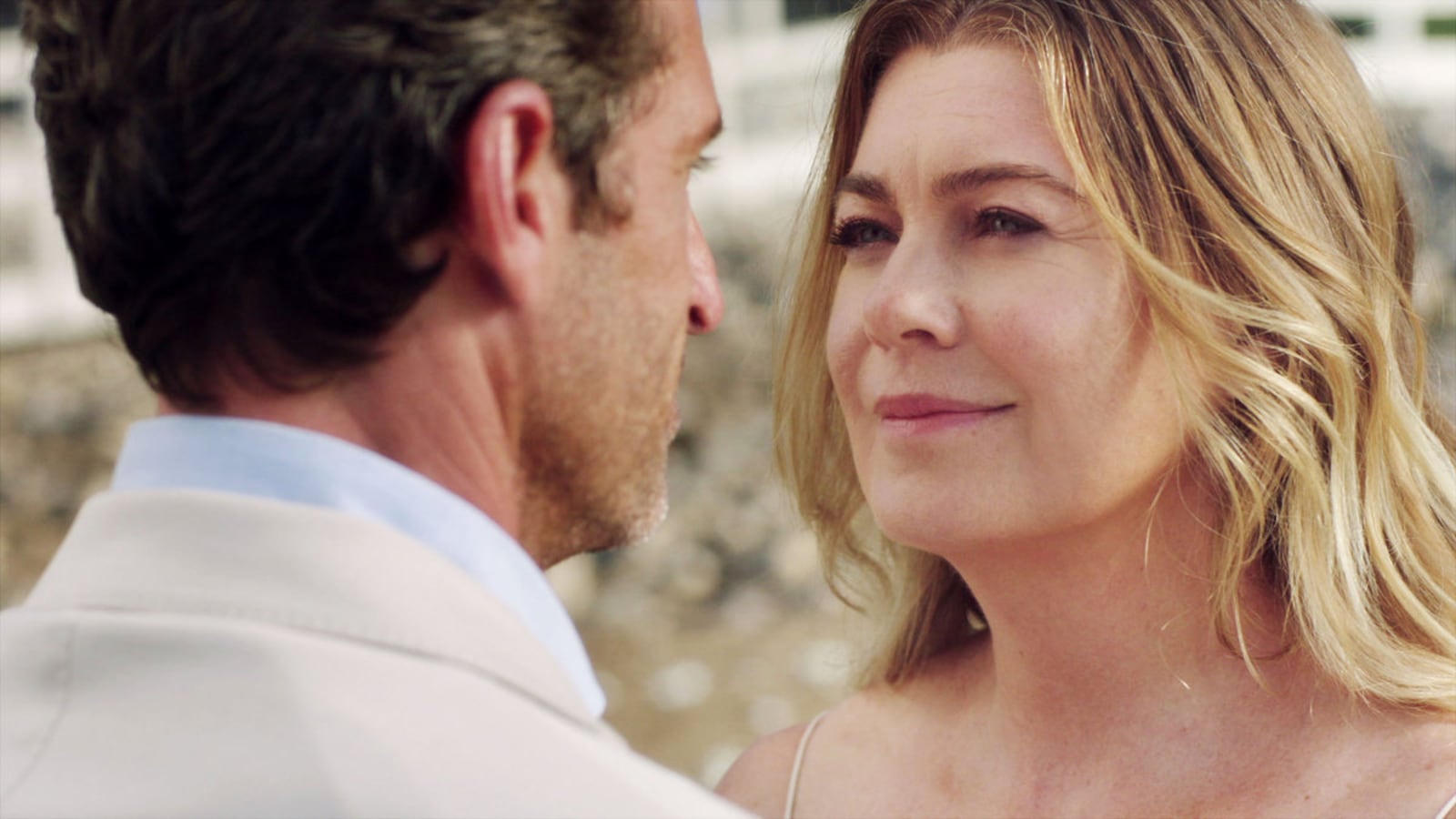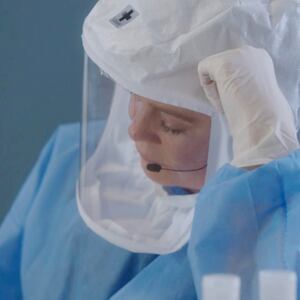In Grey’s Anatomy’s third season, Alex Karev dropped a line that could have been the hospital soap’s mantra. As Seattle Grace’s best doctors scrambled to save the talented but troubled Meredith Grey after she drowned in Puget Sound, her worried fellow resident said, “Meredith always makes me think, I don’t know, screwed up people have a chance.”
Meredith, meanwhile, awoke in the afterlife—greeted by the ghosts Denny Duquette, Kyle Chandler’s bomb squad guy, who blew up during the show’s infamous bazooka episode, and Bonnie Crasnoff, whom fans might better remember as That One Woman Who Died After Being Impaled on a Giant Pole.
More than a decade later, Grey’s Anatomy Season 17 has brought our bruised heroine back to the brink of death. But this time, Meredith’s vision of the afterlife is more serene: As her body languished with COVID-19, she spent nearly every episode on a beach, chatting with dead loved ones like her late sister, Lexie, her old pal George O’Malley, and, of course, Patrick Dempsey’s Derek “McDreamy” Shepherd.
Fans have not been wild about the beach. Unlike that one-off afterlife episode after the drowning, this stunt kept Meredith’s story static for almost the entire season. Sometimes Meredith’s visitors were spirits, and other times they were living people talking to her beside the hospital bed. Regardless of who came to visit, however, the result was the same: Week after week, we all sat waiting patiently (and then not so patiently) for Meredith to just wake the hell up.
As exciting (and surprising) as it was to see Patrick Dempsey in those rolled-up pants, the return of old fan favorites can only sustain a gimmick for so long. But if this longtime Grey’s obsessive can play devil’s advocate for just a moment, I’d argue that Meredith’s beach might actually be this season’s greatest innovation. It cemented just how far Meredith Grey has come in the decade and a half we’ve known her, and uses that symbolic resonance to deepen the season’s COVID-19 storytelling with a trademark tonal blend of soap and borderline-goofy earnestness.
After Meredith drowned in Elliott Bay back in Season 3, she awoke to find herself in a dimly lit version of Seattle Grace. The people who joined her there, from Denny to the bomb guy, were some of the most traumatic deaths she’d witnessed. (Her beloved late dog, Doc, was there, too.) But as Meredith frantically tried to save Bonnie from her inevitable, gory death over and over again in the afterlife, the ghosts who’d gathered had a different agenda: They forced the troubled resident to admit that her drowning was no accident. Bonnie demanded to know, “How can you be a surgeon and have so little respect for life?”
To be clear, Meredith’s beach this season was largely a production tool—an idea that arose as showrunner Krista Vernoff brainstormed ways to add “fan candy” to the season amid a devastating pandemic. “Patrick and I both have homes in Malibu, and we went for a hike one day,” Vernoff explained at the beginning of the season. “And the idea just struck me, so I just said to him, would you ever consider coming and being a part of the storytelling this season?” But as pragmatic and fan service-y as the choice certainly was, it also illustrated the internal shift that’s taken hold in Meredith, particularly after Derek’s death.
When Meredith drowned, she’d been fixated on her mother’s cruel assertion that by falling in love with Derek, she’d become “nothing more than ordinary,” a far cry from the groundbreaking, machine-like surgeon she’d been raised to be. Meredith imagined the gateway to the afterlife as the hospital where she worked. She was trapped in a place where all of the “shoulds” of her life had coalesced into the narrative of who she was meant to be, according to someone else, and surrounded by people she could never save. The redemptive moment right before she woke up? Her mother pulling her into an embrace and insisting, “You are anything but ordinary.”
Years later, Meredith imagines death’s waiting room a little differently. She’s not tortured by the friends and family she couldn’t save, but instead delighted to see them and catch up. Like last time, she’s caught between the need to return to her loved ones and the desire to simply remain in the afterlife—but unlike back then, she’s not waiting for absolution from someone else. These shifts seem to indicate that through the years, Meredith has developed a calm center within herself, embracing the sense of self-ownership and agency that depression and suicidal ideation can often obscure. Throughout the season, it seemed that Meredith herself was largely in control of when and if she woke up. And of course she did, in a heart-rending scene where Zola’s pleas for her mother to wake up came true.
But perhaps most importantly, what distinguishes Meredith’s recent quest to the afterlife from its predecessor is the way we’re meant to interact with it. Shot and released during the pandemic, Grey’s Anatomy’s response to COVID-19 was among the most anticipated broadcast returns of 2020—and it met this perilous moment with the most perilous maneuver it could conjure, threatening the survival of a character who has come to represent the perseverance within all of us. While the characters around Meredith illustrated our various responses to the pandemic—from Amelia and Link’s frantic work-life balance to Taryn Helm’s burnout due to stress and isolation—Meredith herself has represented a bigger struggle.
The first time Meredith almost died, her experience made the internal anguish of suicidal ideation tangible and visceral. This time, her never-ending flirtation with death literalized the hope at stake during this pandemic—and her eventual triumph drives home a broader sense of hope. Meredith’s friends and family were meant to represent each of us this season; she represented all of us as one whole. The beach was just the gloriously obvious (and socially distant) device that made it all happen.
But Meredith was not just a symbolic vessel this season; the final episodes also illustrated how the events of last year, and her miraculous recovery, have once again reshaped her outlook.
In addition to the pandemic, this season also addressed the demands for justice and racial equity that arose once more last year after then-police officer Derek Chauvin murdered George Floyd. Some of the show’s choices resonated: Kelly McCreary delivered an especially compelling performance this season as her character Maggie Pierce struggled with the pressures and never-ending frustrations of being a Black woman working in medicine. And Jackson Avery’s decision to leave Grey Sloan Memorial Hospital to promote racial equity as the leader of his family’s foundation was an unusually smooth write-off for a show that doesn’t always send its characters off so gracefully. (Remember the time Alex Karev disappeared with nothing more than a stupid note?) Other choices, however, like Tom Koracick’s big speech about wanting to be an ally by following Jackson to Boston, felt forced.
And then there’s Meredith who, upon waking up from her coma, has set about bringing change in her own way. She’s taken over the residency program from the already over-extended Richard Webber, and it seems likely we’ll spend more time next season watching her rebuild the curriculum from the ground up with an eye toward equity. During the finale, she uses her newfound authority to fight for a fellow COVID-19 survivor’s double lung transplant—even against chief Miranda Bailey’s wishes.
None of this is surprising coming from Meredith, who once committed insurance fraud to secure healthcare for a young girl whose family was undocumented. But this entire season—the beach, the deaths, the uncertainty, and, most importantly, the parade of Meredith’s dead loved ones, all speak to the mantra Meredith briefly (and, initially, sarcastically) adopted as she recovered from her drowning in Season 3: “People are what matters.” As glad as all of us undoubtedly were to leave that godforsaken, visually numbing beach, you have to admit it’s classic Grey’s.


